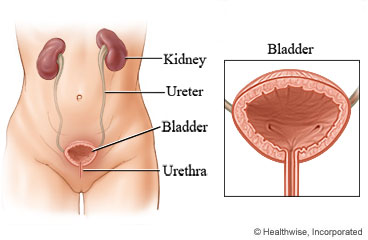
What is bladder augmentation?
Bladder augmentation is surgery to make the bladder larger and improve the way it can stretch. After surgery, your bladder should be able to hold more urine. You will probably urinate less often. If you use a catheter to drain your bladder, you may be able to use the catheter less often.
The doctor will make a cut in your lower belly. This cut is called an incision. Then the doctor will make an incision to open the top of your bladder. He or she will take a piece of tissue from your intestines or stomach. The doctor will form the piece of tissue into a patch. The patch will cover the open area at the top of your bladder. The doctor will stitch the patch in place. Then the incision in your belly will be closed with stitches or surgical staples. You will have a scar on your belly that will fade with time.
Most people go home 4 to 7 days after surgery. You will probably be able to go back to work and most of your usual activities in 4 to 6 weeks. But you may need up to 3 months to fully recover.
How do you prepare for surgery?
Surgery can be stressful. This information will help you understand what you can expect. And it will help you safely prepare for surgery.
 Preparing for surgery
Preparing for surgery
- You may need to go to the hospital the day before surgery to get laxatives to empty your bowels.
- Be sure you have someone to take you home. Anesthesia and pain medicine will make it unsafe for you to drive or get home on your own.
- Understand exactly what surgery is planned, along with the risks, benefits, and other options.
- If you take a medicine that prevents blood clots, your doctor may tell you to stop taking it before your surgery. Or your doctor may tell you to keep taking it. (These medicines include aspirin and other blood thinners.) Make sure that you understand exactly what your doctor wants you to do.
- Tell your doctor ALL the medicines, vitamins, supplements, and herbal remedies you take. Some may increase the risk of problems during your surgery. Your doctor will tell you if you should stop taking any of them before the surgery and how soon to do it.
- Make sure your doctor and the hospital have a copy of your advance directive. If you don't have one, you may want to prepare one. It lets others know your health care wishes. It's a good thing to have before any type of surgery or procedure.
What happens on the day of surgery?
- Follow the instructions exactly about when to stop eating and drinking. If you don't, your surgery may be canceled. If your doctor told you to take your medicines on the day of surgery, take them with only a sip of water.
- Follow your doctor's instructions about when to bathe or shower before your surgery. Do not apply lotions, perfumes, deodorants, or nail polish.
- Do not shave the surgical site yourself.
- Take off all jewelry and piercings. And take out contact lenses, if you wear them.
 At the hospital or surgery center
At the hospital or surgery center
- Bring a picture ID.
- The area for surgery is often marked to make sure there are no errors.
- You will be kept comfortable and safe by your anesthesia provider. You will be asleep during the surgery.
- The surgery will take about 3 hours.
When should you call your doctor?
- You have questions or concerns.
- You don't understand how to prepare for your surgery.
- You become ill before the surgery (such as fever, flu, or a cold).
- You need to reschedule or have changed your mind about having the surgery.
Where can you learn more?
Go to http://www.healthwise.net/patientEd
Enter Z097 in the search box to learn more about "Bladder Augmentation: Before Your Surgery".
Current as of: April 30, 2024
Author: Ignite Healthwise, LLC Staff
Clinical Review Board
All Healthwise education is reviewed by a team that includes physicians, nurses, advanced practitioners, registered dieticians, and other healthcare professionals.

